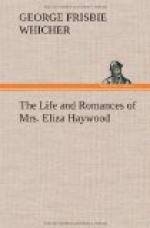[5] Austin Dobson, Eighteenth Century Vignettes, Third Series, 99.
[6] “There were no plays, no operas, no masquerades, no balls, no publick shews, except at the Little Theatre in the Hay Market, then known by the name of F——g’s scandal shop, because he frequently exhibited there certain drolls, or, more properly, invectives against the ministry; in doing which it appears extremely probable that he had two views; the one to get money, which he very much wanted, from such as delighted in low humour, and could not distinguish true satire from scurrility; and the other, in the hope of having some post given him by those he had abused, in order to silence his dramatick talent. But it is not my business to point either the merit of that gentleman’s performances, or the motives he had for writing them, as the town is perfectly acquainted both with his abilities and success, and has since seen him, with astonishment, wriggle himself into favour, by pretending to cajole those he had not the power to intimidate.” The Novelist’s Magazine, XIII, 23. Quoted by Austin Dobson, Op. cit., 100.
[7] Dedication of The Fatal Secret.
[8] The Novelist’s Magazine, XIII, 106. Quoted by W. Forsyth, Novels and Novelists of the Eighteenth Century (1871), 211.
[9] W. Raleigh, The English Novel (Fifth edition, 1910), 139.
[10] J.C. Dunlop, History of Prose Fiction, edited by H. Wilson, II, 568.
[11] Monthly Review, V, 393, October, 1751.
[12] Letters from the Lady Mary Wortley Montagu, Everyman edition, 392.
[13] Letters from the Lady Mary Wortley Montagu, Everyman edition, 457.
[14] Notes and Queries, Series VIII, IX, 366. In Smollett’s Ferdinand Count Fathom, Chap. XXXIX, Captain Miniken recommends as “modern authors that are worth reading” the Adventures of Loveill, Lady Frail, Bampfylde Moore Carew, Young Scarron, and Miss Betsy Thoughtless. See also A.L. Barbauld, Correspondence of Samuel Richardson (1804), IV, 55-6, and the Autobiography and Correspondence of Mary Granville, Mrs. Delaney (1861), First series, III, 79, 214.
[15] J.G. Lockhart, Life of Scott, Everyman edition, 34. Coleridge’s Letters, I, 368.
[16] W. Scott, Old Mortality, Conclusion. Goethe’s Werke (E. Schmidt, Leipsig, 1910), III, 17.
[17] That the Monthly’s review of Betsy Thoughtless, complaining of that novel’s lack of “those entertaining introductory chapters, and digressive essays, which distinguish the works of a Fielding, a Smollett, or the author of Pompey the little,” rankled in the fair novelist’s memory is illustrated by a retort in her next work, Jemmy and Jenny Jessamy, III, Chap. XVIII, which “contains none of those beautiful digressions, those remarks or reflections, which a certain would-be critick pretends are so much distinguished in the writings of his two favorite authors; yet it is to be hoped, will afford sufficient to please all those who are willing to be pleased.” For the review of Jemmy and Jenny Jessamy, see Monthly Review, VIII, 77.




